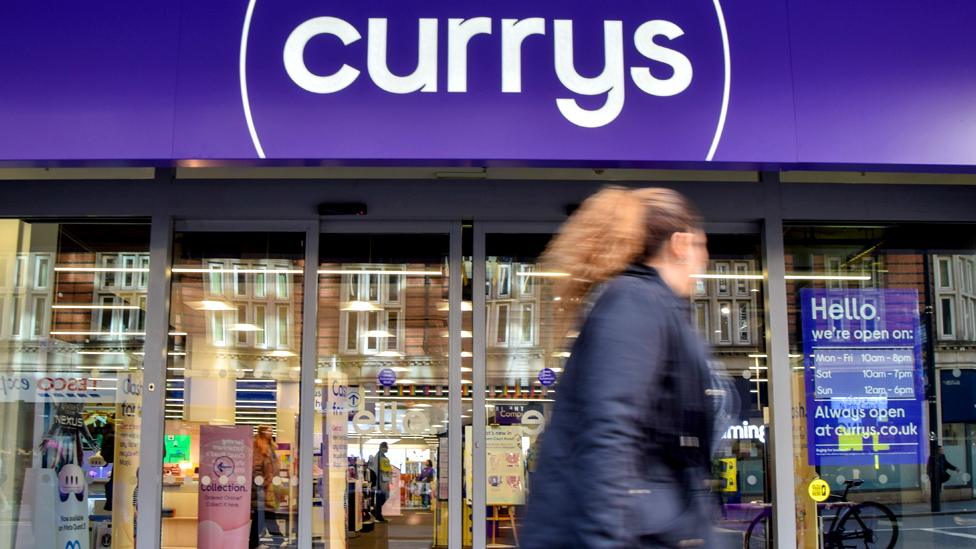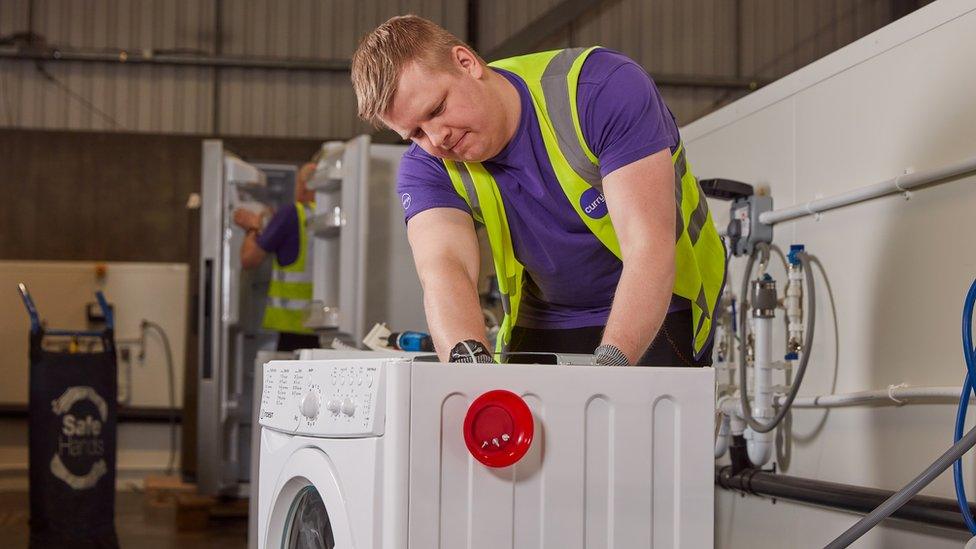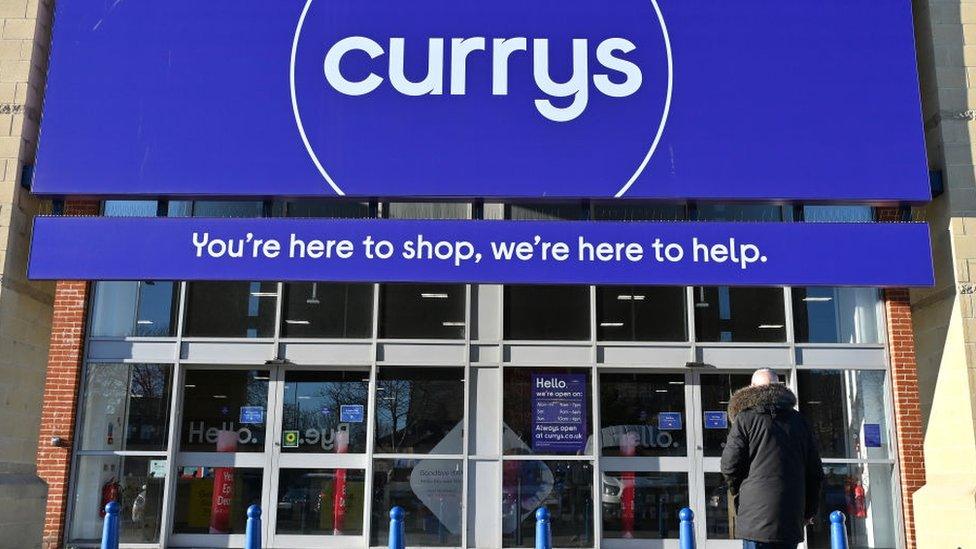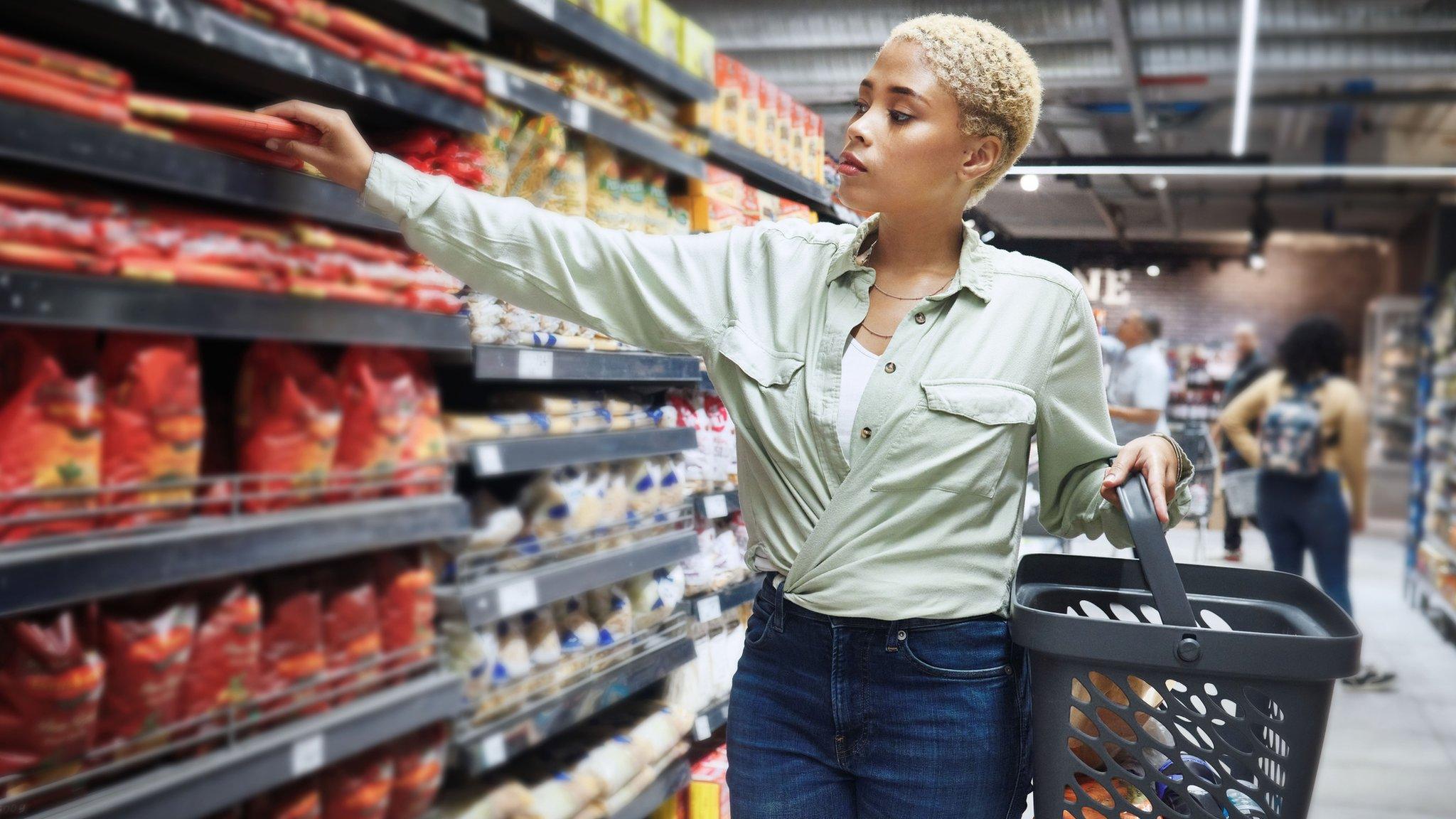Currys takeover battle looms as JD.com eyes bid
- Published
- comments

Currys could be at the centre of a takeover battle after Chinese e-commerce group JD.com said it was considering an offer for the company.
The potential bid emerged after Currys said at the weekend it had rejected a £700m takeover approach from US investment firm Elliott.
JD.com said it was "in the very preliminary stages" of evaluating a possible bid for the retailer.
Currys' share price jumped by more than a third to close at 64p on Monday.
The retailer has more than 800 stores globally and employs 28,000 people. In the UK, it operates about 300 stores with 15,000 staff.
Following reports that it was a potential bidder for Currys, JD.com issued a statement saying it was considering an offer, but added there was "no certainty" a bid would ultimately be made.
The BBC understands that conversations with JD.com on a possible transaction started towards the end of last year as the Chinese firm looked at options to expand internationally because of weaker demand in its home market.
On Saturday, Currys said it had turned down a takeover approach from Elliot of 62p per share, which would have valued it at about £700m, saying the offer "significantly undervalued" the company.
However, reports suggest that Elliott, which bought UK book shop chain Waterstones in 2018, could come back with a higher offer.
Under UK takeover rules, JD.com now has until 18 March to make a formal offer or walk away from the deal. The deadline for Elliot is 16 March.
Currys' share price has fallen by more than a third over the past year and on Friday, before news of the takeover interest, it closed at 47.08p, valuing the business at about £534m.
There is widespread acknowledgement at board level that Currys' share price has long been at a steep discount given its market share and profitability.
Despite this, the board is thought to still be supportive of the current chief executive, Alex Baldock, who has "made great progress on cutting costs" according to one insider.
There are some, however, who say that in hindsight the decision to close down 35 airport stores in 2021 - including at Heathrow - was a mistake.
The one constant competitive pressure throughout Currys' various incarnations - which has seen its name change from Dixons to Dixons Carphone then to Currys - has been Amazon.
One former employee told the BBC that it was critical to match Amazon's prices. If not, customers would visit Currys' stores but order from Amazon on their phones.
Its stores in Nordic countries - where it trades under the Elkjøp brand - have also struggled in recent years.

Services such as Currys' repair business are becoming increasingly important
The rising cost of living has hit many retailers as consumers rein in spending, and Currys said last month that underlying sales had fallen 3% over the key Christmas trading period.
Despite this, the company increased its profit forecast for the year, helped by cost cuts and higher profit margins on some of its services.
Emily Salter from GlobalData said that although it had lost share in recent years, it remains the market leader for electrical goods in the UK, "making it an attractive acquisition proposition".
As well as selling electrical goods through its stores and online, the previous management team tried to improve Currys' by expanding into installation and support services which has grown into a substantial business.
Revenue from its Care & Repair business - which offers protection, repair, refurbishment and recycling services - is growing. Its iD Mobile virtual mobile network has recorded a 30% rise in subscribers over the past year to 1.6 million.
Last week, analysts at Investec said the Care & Repair business alone could be worth as much as £667m, while mobile business could be valued at about £500m.
Ben Hunt, equity retail analyst at Investec, said the interest in Currys reflected the fact that while "the news isn't getting any worse" for many struggling retailers at the moment, with price rises easing and real incomes now improving, share prices remain low in the sector and do not reflect the potential for recovery.
This makes companies such as Currys an "easy steal" for private equity firms who are looking to pick up undervalued businesses, he said.
In addition, Currys has "done a lot of the heavy lifting" already for any potential suitor, having cut £300m from its annual costs.
Many commentators have said that UK firms are looking undervalued, and Erik Hirsch, co-chief executive of the US private equity firm Hamilton Lane, told the BBC's Today programme: "I think everyone's looking at the UK more closely.
"Private markets are always looking for value... and today the UK is certainly offering that in places."
- Published18 February 2024

- Published16 February 2024

- Published6 July 2023
